Related Research Articles
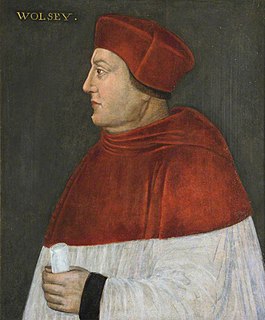
Thomas Wolsey was an English archbishop, statesman and a cardinal of the Catholic Church. When Henry VIII became King of England in 1509, Wolsey became the King's almoner. Wolsey's affairs prospered, and by 1514 he had become the controlling figure in virtually all matters of state. He also held important ecclesiastical appointments. These included the Archbishopric of York—the second most important role in the English church—and acting as papal legate. His appointment as a cardinal by Pope Leo X in 1515 gave him precedence over all other English clergy.
George Cavendish was an English writer, best known as the biographer of Cardinal Thomas Wolsey. His Thomas Wolsey, Late Cardinall, his Lyffe and Deathe is described by the Oxford Dictionary of National Biography as the "most important single contemporary source for Wolsey's life" which also offers a "detailed picture of early sixteenth-century court life and of political events in the 1520s, particularly the divorce proceedings against Catherine of Aragon.

Cuthbert Tunstall was an English Scholastic, church leader, diplomat, administrator and royal adviser. He served as Prince-Bishop of Durham during the reigns of Henry VIII, Edward VI, Mary I and Elizabeth I.
John Bell LL. D was a Bishop of Worcester (1539–1543), who served during the reign of Henry VIII of England.
Richard Taverner is best known for his Bible translation, The Most Sacred Bible whiche is the holy scripture, conteyning the old and new testament, translated into English, and newly recognised with great diligence after most faythful exemplars by Rychard Taverner, commonly known as Taverner's Bible.
Florentius Volusenus was a Scottish humanist most noted for his De Animi Tranquillitate. "Florentius Volusenus" is a latinization of uncertain derivation; his first name is variously suggested as Florence or Florens, and surname as Wolson, Wolsey, or Wilson. In his letters written in English he refers to himself as Volusene.
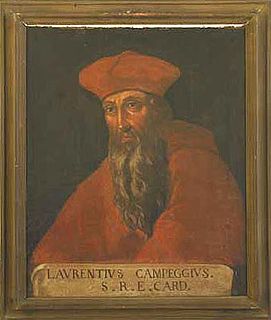
Lorenzo Campeggio was an Italian cardinal and politician. He was the last cardinal protector of England.
Thomas Ruthall was an English churchman, administrator and diplomat. He was a leading councillor of Henry VIII of England.
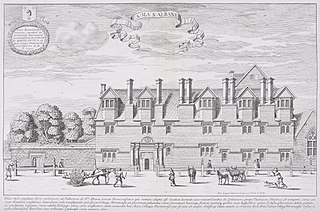
St Alban Hall, sometimes known as St Alban's Hall or Stubbins, was one of the medieval halls of the University of Oxford, and one of the longest-surviving. It was established in the 13th century, acquired by neighbouring Merton College in the 16th century but operated separately until the institutions merged in the late 19th century. The site in Merton Street, Oxford, is now occupied by Merton's Edwardian St Alban's Quad.

Christ Church Cathedral is the cathedral of the Anglican diocese of Oxford, which consists of the counties of Oxfordshire, Buckinghamshire and Berkshire. It is also the chapel of Christ Church at the University of Oxford. This dual role as cathedral and college chapel is unique in the Church of England.
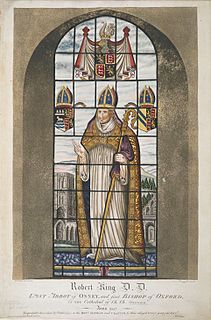
Robert King was an English churchman who became the first Bishop of Oxford.

Girolamo Ghinucci was an Italian papal administrator, diplomat and Cardinal.
John Clement was an English Roman Catholic physician and humanist. He was tutor to Thomas More's children, and became President of the College of Physicians.
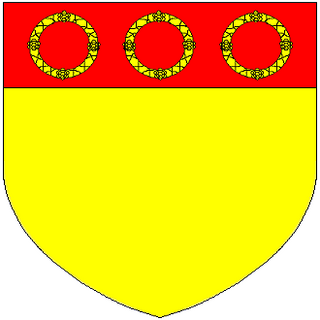
Sir Richard Morrison was an English humanist scholar and diplomat. He was a protégé of Thomas Cromwell, propagandist for Henry VIII, and then ambassador to the German court of Charles V for Edward VI.

John Young (1514–1580) was an English Catholic clergyman and academic. He was Master of Pembroke Hall, Cambridge, and was later imprisoned by Elizabeth I. He is not John Young (1534?–1605), Master of Pembroke Hall later in the century, and afterwards Bishop of Rochester.
Hugh Weston was an English churchman and academic, dean of Westminster and Dean of Windsor, and Rector of Lincoln College, Oxford.
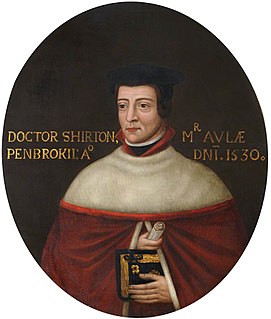
Robert Shorton was an English churchman and academic, first Master of St John's College, Cambridge and Archdeacon of Bath.
John Chambers was an English Benedictine, the last Abbot of Peterborough and first Bishop of Peterborough.
John Cottisford was an English churchman and academic, Rector of Lincoln College, Oxford from 1518.
Thomas Forman, was an early English reformer who served as the rector of All Hallows, Honey Lane and also as President of Queens' College, Cambridge. He is chiefly remembered for distributing heretical books before the English Reformation with his curate Thomas Gerrard.
References
- ↑ Le Neve, Fasti, ii.183
![]() This article incorporates text from a publication now in the public domain : "Brinknell, Thomas". Dictionary of National Biography . London: Smith, Elder & Co. 1885–1900.
This article incorporates text from a publication now in the public domain : "Brinknell, Thomas". Dictionary of National Biography . London: Smith, Elder & Co. 1885–1900.